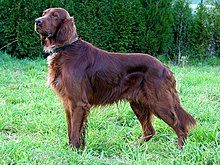Red setter

Irish Setter
|
||||||||||||||||||||||||||
| Other names | Red Setter (Irish: sotar rua) Irish Red Setter |
|||||||||||||||||||||||||
|---|---|---|---|---|---|---|---|---|---|---|---|---|---|---|---|---|---|---|---|---|---|---|---|---|---|---|
| Origin | Ireland | |||||||||||||||||||||||||
|
||||||||||||||||||||||||||
| Domestic dog (Canis lupus familiaris) | ||||||||||||||||||||||||||
| Classification / standards | |||
|---|---|---|---|
| FCI | Group 7, Section 2.2 Setter #120 | standard | |
| AKC | Sporting | standard | |
| ANKC | Group 3 (Gundogs) | standard | |
| CKC | Group 1 – Sporting | standard | |
| KC (UK) | Gundog | standard | |
| NZKC | Gundog | standard | |
| UKC | Gundog | standard | |
The Irish Setter (Irish: sotar rua, literally "red setter") is a setter, a breed of gundog, and family dog. The term Irish Setter is commonly used to encompass the show-bred dog recognised by the American Kennel Club as well as the field-bred Red Setter recognised by the Field Dog Stud Book.
The coat is moderately long, silky, and of a red or chestnut color. It requires frequent brushing to maintain its condition and keep it mat-free. The undercoat is abundant in winter weather, and the top coat is fine. Their coats should also feather in places such as the tail, ears, chest, legs, and body. Irish Setters range in height from 24 to 28 inches (61 to 71 cm), males weigh 65 to 75 lb (29 to 34 kg) and females 55 to 65 lb (25 to 29 kg). The FCI Breed Standard for the Irish Setter stipulates males stand 23 to 26.5 inches (58 to 67 cm) tall, and females be 21.5 to 24.5 inches (55 to 62 cm) tall. Irish Setters are deep chested dogs with small waists. An Irish Setter's life expectancy tends to be around 11 to 12 years.
Irish Setters get along well with children, other dogs, and will enthusiastically greet visitors. Even though they do well with household pets, small animals may pose a problem for this breed, as they are a hunting breed. Some Irish Setters may have problems with cats in the house, and may be too rambunctious with small children. As the FCI, ANKC and UK Standards state, the breed should be "Demonstrably affectionate." As a result, Irish Setters make excellent companion animals and family pets.
Irish Setters are an active breed, and require long, daily walks and off-lead running in wide, open spaces. They are, however, a breed with a tendency to 'play deaf,' so careful training on mastering the recall should be undertaken before allowing them off-lead.
Irish Setters enjoy having a job to do. Lack of activity will lead to a bored, destructive, or even hyperactive dog. This is not a breed that can be left alone in the backyard for long periods of time, nor should they be. Irish Setters thrive on constant human companionship. Irish Setters respond swiftly to positive training and are highly intelligent.
Though they are usually alert to their surroundings, Irish Setters are not well-suited as guard dogs, as they are not a naturally assertive breed.
Irish Setters are also widely used as therapy dogs in schools and hospitals. Therapy dogs are permitted in hospitals with special permission and can visit patients on the assigned floors. This is a venue where the therapy dogs are permitted in schools and then asked to sit with children as the students read to the Irish Setter. This process helps to enable the student the ability to read without being corrected or judged. Generally the Irish Setter will lie on the floor with the student as the student continues to read, in this calming and relaxed setting.
...
Wikipedia
